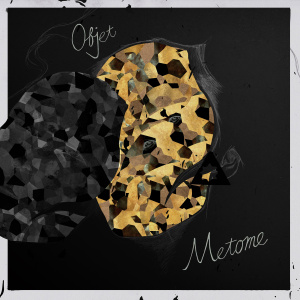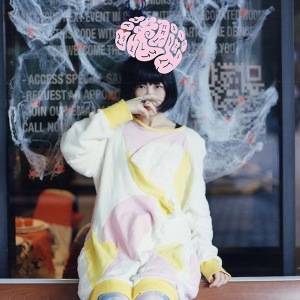
Clip art forever

5. Metome Objet
It was another solid year for the Kansai electronic music scene, and 2015 looks like it will keep the trend rolling – just look at this Seiho and Avec Avec video! Still, the best-album-out-of-the-region race ended really early in 2014 – Osaka’s Metome dropped Objet just as the calendar was getting used to “January,” and nothing has come close to touching it yet. It doesn’t do anything particular new in the area or in the genere…Metome just does it better than the rest. Objet is full of chopped-up vocals cascading over one another (“Quiet Room,” “Magic Cloud ‘1970”) and even some turned down into molasses (“Black Black”), but arranged in the perfect sequence to never be too overwhelming. And, as twisted as the voices could get, Metome remembered to include something funky to keep it grounded — for all its weird touches, Objet is one of the best dance albums to come out of Japan this year. A lot of producers all over the globe tried doing something similar to what Metome pulled off here, but few made it sound so experimental and accessible.

4. may.e Reminder/Spangle
Last year, singer-songwriter may.e released two albums – Mattiola, our pick for the number-two album of 2013, and Shiseitsukatsu, which came out right at the end of the year. On the first she sang entirely in English, and on the second just in Japanese…yet that almost felt like a way to highlight what made her music so hypnotic. She only uses acoustic guitar and her voice, yet creates spinning, ecstatic numbers out of such simple elements. It’s like having a campfire sing-a-long and just staring into the flame while being overwhelmed. This year’s pair of Reminder and Spangle were done all in her native Japanese…and at times the lyrics could add power to the songs…but you didn’t need to know a lick of the language to be pulled inside. Both are varied records, but Reminder tends to be a bit more outgoing, featuring the hop-and-skip joy of “Metro” and the soul-barring “Favor,” which ended with her most powerful vocal passage to date, her hollering “stop” over and over again, a total release (and a song boosted by touches of what sounds like electric guitar).
Spangle was more introspective, and touch less rapturous and more reflective without losing may.e’s ability to mesmerize. Her voice, usually multi-tracked, was suddenly pushed to the front and isolated more than usual, revealing new vulnerability. The title track let her voice do all the emotional lifting, the end result sparse but among the most emotionally affecting songs of 2014. Coupled with a live performance in a park that towers over the rest of the Tokyo Acoustic Session (this is a compliment to may.e), these two albums offered further insight into the indie scene’s most intriguing voice going.

3. Especia Gusto
I knew Especia would be a problem when their hypeman at a show in Tokyo last December screamed out “Japanese vaporwave idols.” This is the marketing (or trap) behind most idol groups over the last few years — zoom in on something, whether it be heavy metal or electro-pop or Fukuoka or steampunk — and snare in people who aren’t your typical idol fan. And here, at last, was an idol group for me to get weird about, as they embraced the warped-VHS-tape-visuals of an Internet microgenre and the sweet luxurious sounds of ’80s City Pop. This felt different!
Of course, it wasn’t…Especia are idols, and for all their trickery (their aesthetic would be tops this year) they are still caught up in a system that has played a central role in diminishing J-pop today. Not that the music can’t be great…acts such as Dempagumi.inc, Negicco, Lyrical School and, yep, Babymetal made some of the most exciting pop of the year, thanks to a combination of veteran song writers and burgeoning producers given a major label shot. But is it worth it when it still props up a system where fandom is glorified way more than good songs, and said fandoms can get rancid really fast. But Especia, dear goodness, felt different…the music! The merch! The vaporwave, damn it! The fans around me basically seemed like your stereotypical boogie-man hipster, not your typical Akihabara denizen. The editor-in-chief of Gawker cited their “No1 Sweeper” as one of his 2014 highlights.
This was an illusion, and they are idols who force you to reflect on a lot. But fuck it — Gusto does transcend a lot of that by being the year’s most consistently great idol-pop album of the year. Primary producer Schtein&Longer crafts a brassed-out sound zigging between the resort-dreaming sounds of ’80s Japanese pop music and the early ’90s pomp of acid jazz, with very little filler along the way. Saxophone dollops abound, and whenever things appear ready to lag a bit, something jolts the album awake, like producer PellyColo’s eight-minute, wind-swept remix of an older Especia joint. Even separated from their best-of-the-year videos, songs still packed a wallop as simple audio experiences. “No1 Sweeper” blows up in hi-definition and is the most sexually charged song on an album full of them (whereas other idols act puritanical, Especia weren’t hesitant to sing about sex), while “Kurukana” remains a deeply sweet song when it isn’t playing out in front of screensavers. Whatever hesitations idol culture gives me…and whether or not Especia’s major-label shift next year ends up a success or a disaster…I’ll always have Gusto, a pop wonder all its own.

2. mus.hiba White Girl
“It’s like being on Willie Nelson’s bus!” David Letterman cracked after holographic pop star Hatsune Miku wrapped up her performance on his late-night TV show. This moment — old TV host interacting with virtual teenager — was Vocaloid culture’s surreal high point, captured on Twitter by those with an interest in Miku talking about how close the singularity was while retweeting middle-aged people confused by the anime on their CBS. But listen again to the song she performed that night…it isn’t very good. But that is, to a large degree, what Vocaloid culture morphed in to for many, as many in Japan and abroad are more interested in the characters than the sound…let alone seeing what a truly intriguing piece of technology is capable of.
Tokyo producer mus.hiba doesn’t use Hatsune Miku, but rather the voice of Yufu Sekka, who isn’t even technically a Vocaloid…she an UTAU, basically the freeware version of the singing-synthesizer software. Yet with White Girl, his debut album, he created the first truly great experimental album using the technology, rising above cheap novelty (Hatsune Miku…but with a metal band!) to create a cohesive listen that stood as just great music. Even though mus.hiba likes the character herself — the album is titled after her, and every song takes on a “winter” theme to reflect her personality — he wasn’t afraid to turn her digi-whisper into another layer of instrumentation, to treat her singing as something to experiment with.
And the results were stunning, the album running from fever-dream slow burners such as “Slow Snow,” woozy 8-bit meditations such as “Magical Fizzy Drink” and moments of violence — the otherwise serene “Darkness” gives way to a roar of synthesizers, like building a snowman only to find oneself caught in a blizzard. Plenty of good Vocaloid and UTAU songs have emerged from Nico Nico and YouTube, but nobody bent the technology into something so exciting as mus.hiba did here.

1. Oomori Seiko Sennuo
Every modifier and potential thinkpiece jumping-off point about Oomori Seiko vanishes the moment “Imitation Girl” roars to life. The second song on her debut album for the Avex label…and thus, her first widely distributed and heavily promoted collection…is an EDM song, featuring a pounding build and, eventually, a plunge into Skrillex-influenced bass freakout. Yet Oomori grabs one of the laziest possible templates for a pop song this decade (see ya over there, “Break Free”) and puts her spin on it. There are harps, a sweetly sung chorus, a moment early where she gets to shriek “fuck” at the listener.
In that moment, Sennuo rejects every idea that has been attached to her in favor of making it clear this is all about her, an attitude made clearer when she (somewhat controversially) told an interviewer that she didn’t associate with the idea of feminism. It’s the sort of line that could easily blown up into something way bigger, but (as Ian Martin pointed out) it hints at what makes Oomori tick — she doesn’t associate with anything, and just does her thing. She’s selfish…and bless her for it, because it makes the songs on Sennuo all the more fascinating.
Elsewhere I’ve babbled about why I think this album is important, so let’s take a paragraph to focus on how good this sounds because what a rollercoaster of an album. Beyond her interpretation of EDM, Oomori plays around with sample-heavy jingle land, downtrodden ballad laced with mentions of suicide, and rollicking dance-pop disguised as a rock ‘n’ roll paradise. Her singing voice remains her strongest tool, capable of a dozen emotions on the bare-boned “Date Wa Yameyou” or shrieks elsewhere…or menace on the album’s surf-rock-EDM-meets-pop-punk number. Yet the music…all written by her…is every bit as unpredictable as her voice. Songs cycle through multiple genres in under four minutes – “Yakiniku Date” swings through piano balladry, rock and then full-blown techno-pop – while others get by with unsettling sonic details (“Kisumii Kirumii” is the sweetest song here, but bursts of guitar and sudden drum beats add a bit of chaos to it all).
A theme connecting the world’s of bedroom musicians and idol-pop is the idea of escape, retreat into a different world, one where you can indulge a fantasy of your own creation or one propped up by a major label. That’s fine (well, the latter case…not always) and Sennuo finds Oomori doing more or less the same thing. Except the final product is far more confrontational and divisive which…is really exciting! When was the last time people hated a major-label Japanese artist for reasons that weren’t tied to extreme fandom (“slay Perfume queens, slay, tower over Kyary, nah”) or just general boredom (“every AKB48 song sounds the same”)? And there are all sorts of legitimate issues to be raised against Oomori, from her views on feminism to her path to stardom in relation to Koenji’s music scene. None of that makes Oomori’s debut my favorite album of the year…the music, to me, is among the most exciting to come from any Japanese artist this year…but it makes me want to rally around it a whole bunch more, because she’s gone and made a truly interesting album on a major label’s dime. She wimpered and shrieked and sighed her voice into the wilds of contemporary J-pop, and ended up saying the most intriguing things of all.
